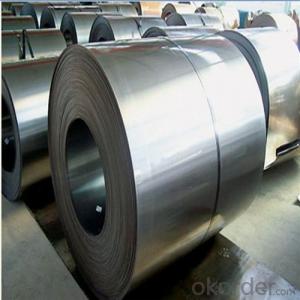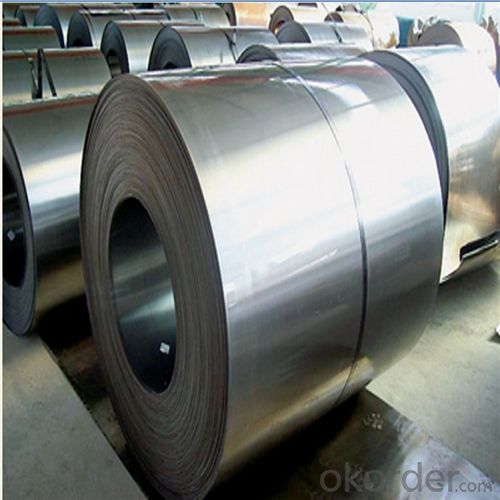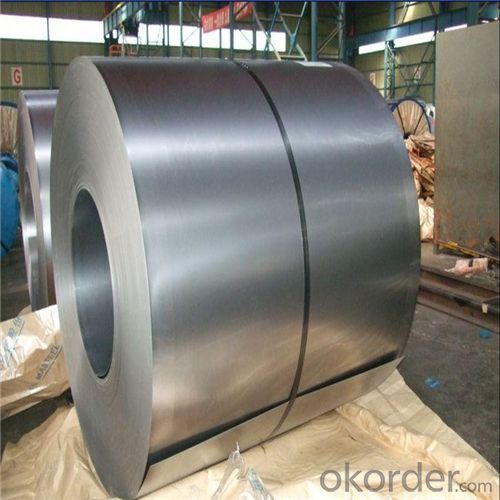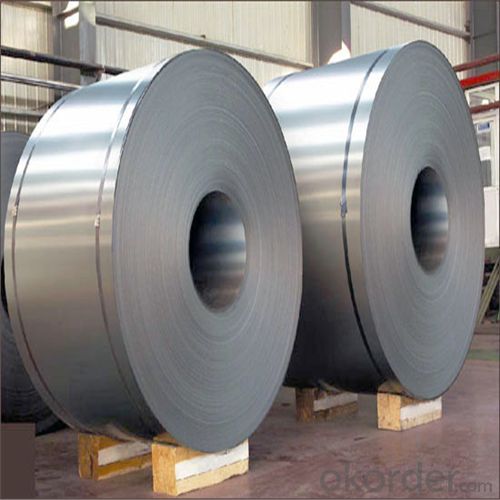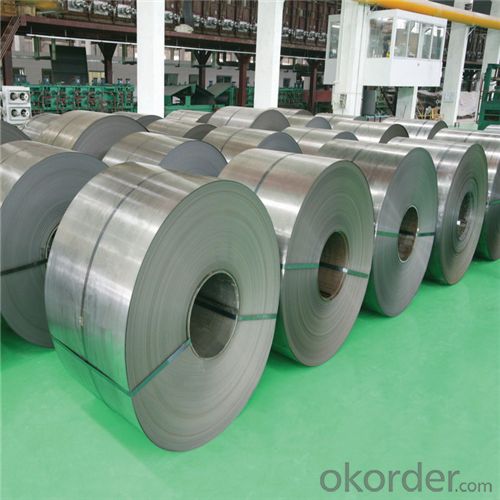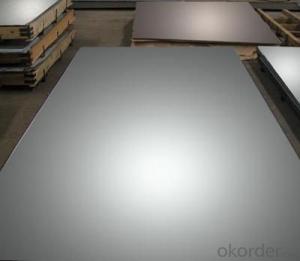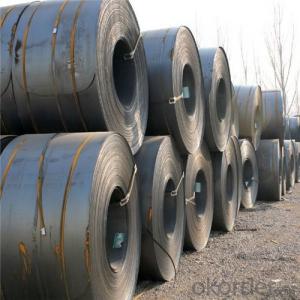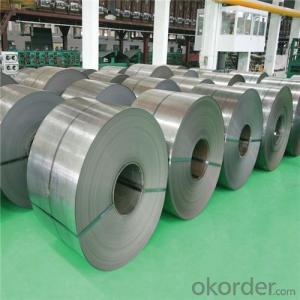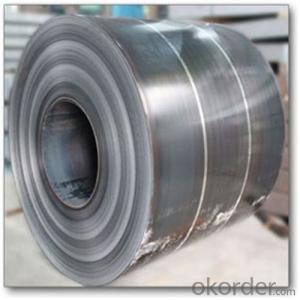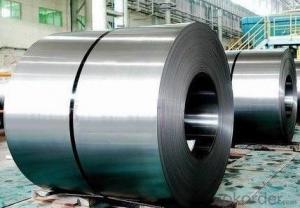Hot Rolled Steel Coil Used for Industry with Competitive Price
- Loading Port:
- Tianjin
- Payment Terms:
- TT OR LC
- Min Order Qty:
- 50 m.t.
- Supply Capability:
- 10000 m.t./month
OKorder Service Pledge
OKorder Financial Service
You Might Also Like
Hot Rolled Steel Coil Used for Industry
1.Structure of Hot Rolled Steel Coil Description
Rolled to its final dimensions while it’s hot enough to scale, our hot-rolled steel is an amalgamation of the various qualities of steel. It can be in the form of plates, sheet and coils. Our Hot-Rolled Steel Sheets and Coils are applied to a wide range of uses such as automobile, electrical appliance, machinery manufacturing, container manufacturing, shipbuilding, bridge, pipeline, and receive high acclaim from our customers for its excellent quality.
2.Main Features of the Hot Rolled Steel Coil
•High Purity
•Easy control and operation
•High strength
•Fast melting
•Competitive price
•Best Service
3. Cold Rolled Steel Coil Images
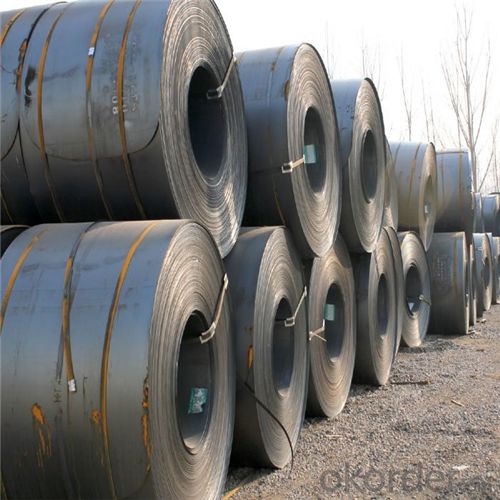
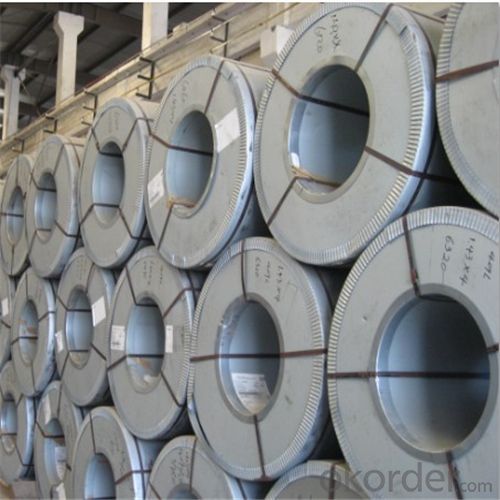
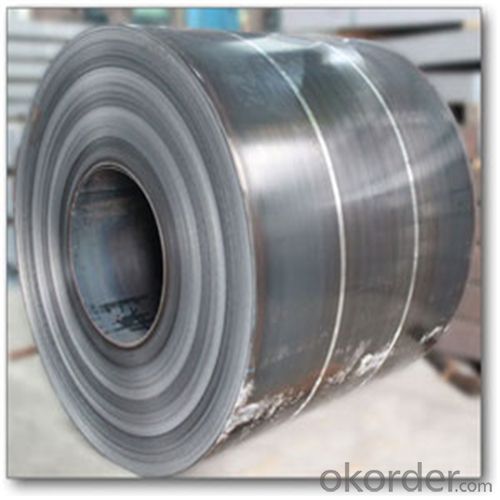
4. Hot Rolled Steel Coil Specification
HOT ROLLED STEEL COIL | |
Thicknenss | 1.5mm-25mm |
Width | 600mm-2000mm |
Sheets length | ---- |
Coil inner diameter | 762mm |
Surface treatement | ---- |
Coil weight | ---- |
5.FAQ of Hot Rolled Steel Coil
We have organized several common questions for our clients,may help you sincerely:
①How about your company?
A world class manufacturer & supplier of castings forging in carbon steel and alloy steel,is one of the large-scale professional investment casting production bases in China,consisting of both casting foundry forging and machining factory. Annually more than 8000 tons Precision casting and forging parts are exported to markets in Europe,America and Japan. OEM casting and forging service available according to customer’s requirements.
②How to guarantee the quality of the products?
We have established the international advanced quality management system,every link from raw material to final product we have strict quality test;We resolutely put an end to unqualified products flowing into the market. At the same time, we will provide necessary follow-up service assurance.
③How long can we receive the product after purchase?
In the purchase of product within three working days, We will arrange the factory delivery as soon as possible. The pecific time of receiving is related to the state and position of customers.Commonly 7 to 10 working days can be served.
- Q: I want to know because I'm going to Hershey Park on Wednesday and Steel Force looks about the same size, so, I wanted to know. It's not that Steel Force is too big for me.
- steel force breaks the 200ft mark and is a steel out and back roller coaster. Tidal force is a water ride that is about 100 ft tall. If you can do Steel Force then you should be able to handle anything at Hersheypark. the on;y ride they have bigger is the Kissing Tower
- Q: Can steel coils be coated with self-cleaning materials?
- Yes, steel coils can be coated with self-cleaning materials. These materials, typically hydrophobic or photocatalytic coatings, can help prevent the accumulation of dirt, grime, and other contaminants on the surface of the steel coils. This not only maintains the aesthetic appeal of the coils but also reduces the need for frequent cleaning and maintenance.
- Q: Looking for an insight here into what hiking with steel toe-capped boots would be like, as I saw a nice pair of steel toed magnums that I plan to use for my future hiking (which I will be doing a fair amount of in the future). They seemed fairly comfortable, but I am curious into what others have to say and what might be known of this sort of approach. Thanks in advance.
- They are very heavy not like hiking boots but it is your choice
- Q: What are the dimensions of steel coils used in the electrical equipment industry?
- The dimensions of steel coils utilized in the electrical equipment industry may differ based on the particular application and requirements of the equipment being produced. However, there are certain dimensions that are commonly employed in this industry. Typically, the width of steel coils employed in the manufacturing of electrical equipment ranges from 0.5 inches to 72 inches (1.27 cm to 182.88 cm). The thickness of these coils can vary from extremely thin, measuring 0.005 inches (0.0127 cm), to considerably thick, measuring 0.25 inches (0.635 cm). The length of steel coils employed in the electrical equipment industry can also vary, but it is often determined by the production process and the specific equipment being manufactured. Coils can range in length from a few feet to several hundred feet. Moreover, the weight of steel coils can differ based on their dimensions and the type of steel being utilized. For example, a common weight range for steel coils employed in the electrical equipment industry falls between 5,000 pounds (2,268 kg) and 50,000 pounds (22,680 kg). It should be noted that these dimensions are not fixed and can vary depending on the specific requirements of the electrical equipment industry. Manufacturers may have their own distinct specifications and requirements for the steel coils they utilize in their products.
- Q: Cast steel welding
- I Use these for cast iron, www.yms .uk/welding-rod-small-pack/2.5mm-cast-iron-welding-rod-small-pack/1951/11612/detail.asp they are expensive when compared to welding rods for steel but i find that normal steel ones dont work on cast iron
- Q: How are steel coils inspected for color consistency?
- Steel coils are inspected for color consistency using a variety of methods to ensure that the final product meets the desired specifications. One common method is visual inspection, where trained inspectors examine the steel coils under controlled lighting conditions to detect any variations in color. This is done by comparing the color of each coil to a standard color chart or a previously approved sample. Any discrepancies are noted and further analysis is conducted. Additionally, advanced technologies such as spectrophotometers may be employed to measure the color of the steel coils objectively. Spectrophotometers use light to measure the reflective properties of the steel surface, allowing precise color analysis. The obtained color data is then compared to the specified color range, and any deviations are flagged for further investigation. Furthermore, some manufacturers may use automated color measurement systems, such as colorimeters or color cameras, to inspect steel coils for color consistency. These systems can quickly and accurately assess the color of each coil, ensuring uniformity across the entire batch. Overall, the inspection of steel coils for color consistency involves a combination of visual inspection, spectrophotometry, and automated color measurement systems. This comprehensive approach helps to guarantee that the steel coils meet the required color standards, providing consistent and high-quality products to customers.
- Q: They say it's some six times stronger than steel. need some explanation.
- Most importantly, spider silk is extremely lightweight: a strand of spider silk long enough to circle the Earth would weigh less than 500 grams (18 oz). Spider silk is also especially ductile, able to stretch up to 140% of its length without breaking. It can hold its strength below ?40 °C. This gives it a very high toughness (or work to fracture), which equals that of commercial polyaramid (aromatic nylon) filaments, which themselves are benchmarks of modern polymer fiber technology. What this means in regard to what you have heard is that if you compared the tensile strength (type 'tensile strength' on wikipedia if you do not know what it means) of spider silk and a strand of steel at the same thickness, the silk would have a higher tensile strength than many grades of steel, upto that of high grade steel - of which they are about the same.
- Q: How do steel coils contribute to the aerospace industry?
- Steel coils contribute to the aerospace industry in several ways. Firstly, they are used in the manufacturing of aircraft structures and components. Steel coils are often transformed into sheets, plates, or other forms that can be shaped and welded to create various parts of an aircraft, such as wings, fuselage, and landing gear. The high strength and durability of steel make it an ideal material for these critical components, ensuring the safety and reliability of the aircraft. Secondly, steel coils are utilized in the production of jet engines. The high temperatures and extreme conditions that engines operate in require materials with excellent heat resistance and mechanical properties. Steel coils, particularly those made from alloys such as stainless steel or nickel-based alloys, possess the necessary qualities to withstand the demanding environment within a jet engine. These coils can be processed into turbine blades, exhaust system components, and other engine parts, contributing to the overall performance and efficiency of the aircraft. Moreover, steel coils are also used in the construction of aerospace infrastructure and ground support equipment. Steel structures, such as hangars, maintenance facilities, and launch pads, require strong and durable materials to ensure their stability and longevity. Steel coils are often fabricated into beams, columns, and other structural elements that form the backbone of these facilities, providing the necessary strength to withstand the loads and vibrations associated with aerospace operations. In summary, steel coils play a crucial role in the aerospace industry by providing the necessary strength, durability, and heat resistance required for the manufacturing of aircraft structures, engine components, and aerospace infrastructure. Their contribution ensures the safety, performance, and reliability of aircraft, allowing for the advancement of aviation technology and the exploration of new frontiers in aerospace.
- Q: How are steel coils used in the production of furniture components?
- Steel coils are commonly used in the production of furniture components due to their strength, durability, and versatility. These coils, which are made from high-quality steel, are first uncoiled and then fed into a machine called a stamping press. The stamping press uses a die to shape and cut the steel coil into various components required for furniture production, such as chair frames, table legs, or brackets. The use of steel coils allows for the mass production of furniture components with consistent dimensions and high precision. The strength of steel ensures that the components can withstand heavy loads and provide stability to the furniture. Additionally, steel coils can be easily formed into different shapes and sizes, enabling the production of a wide variety of furniture designs. Moreover, steel coils are often coated or treated with protective layers such as paints or galvanization to enhance their resistance to corrosion, moisture, and wear. This ensures that the furniture components have a longer lifespan and maintain their aesthetic appeal over time. In summary, steel coils play a crucial role in the production of furniture components by providing strength, durability, and versatility. They enable the mass production of precise and consistent components, and their protective coatings ensure the longevity and quality of the final furniture products.
- Q: What are the factors that affect the quality of steel coils?
- The quality of steel coils can be influenced by various factors. To begin with, the composition of the steel itself plays a vital role in determining its quality. Impurities like sulfur or phosphorus can have a negative impact on the strength, durability, and overall performance of the steel. Additionally, the quality of the steel is affected by its carbon content, alloying elements, and heat treatment. Furthermore, the quality of the steel coils is greatly affected by the manufacturing process and techniques utilized during production. Factors such as the cleanliness of the production environment, the precision of the rolling and cooling processes, and the control of temperature and pressure throughout manufacturing all contribute to the final quality of the coils. Additionally, the surface quality of the steel coils is a crucial factor. Any defects or imperfections on the surface, such as scratches, dents, or corrosion, can compromise the integrity and functionality of the coils. It is essential to handle, store, and transport the coils properly to maintain their surface quality. Moreover, the mechanical properties of the steel coils, including tensile strength, yield strength, and elongation, are essential indicators of their quality. These properties depend on various factors, such as the type of steel, its thickness, and the processing conditions. Lastly, external factors such as environmental conditions, like humidity and temperature, can affect the quality of steel coils. Exposure to moisture or extreme temperatures can lead to corrosion or other forms of degradation, impacting the overall quality and lifespan of the coils. In conclusion, the quality of steel coils is influenced by several factors, encompassing the composition of the steel, the manufacturing process, surface quality, mechanical properties, and external environmental conditions. It is crucial to carefully control and monitor these factors to produce high-quality steel coils that meet the desired specifications and standards.
Send your message to us
Hot Rolled Steel Coil Used for Industry with Competitive Price
- Loading Port:
- Tianjin
- Payment Terms:
- TT OR LC
- Min Order Qty:
- 50 m.t.
- Supply Capability:
- 10000 m.t./month
OKorder Service Pledge
OKorder Financial Service
Similar products
Hot products
Hot Searches
Related keywords
